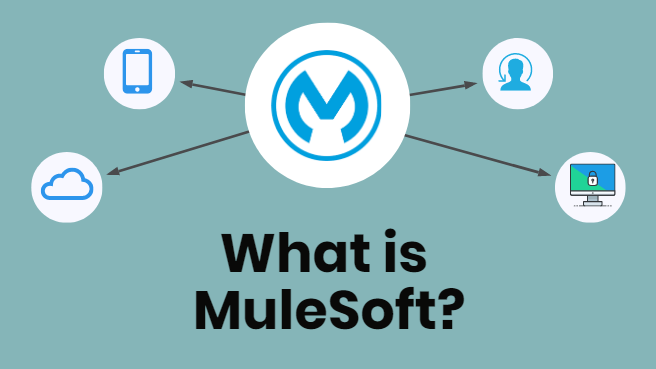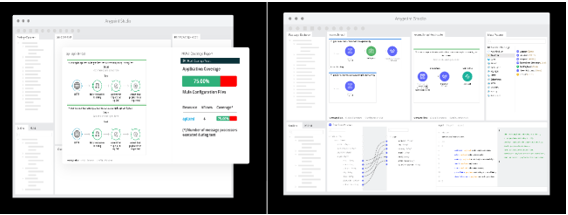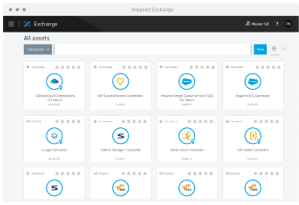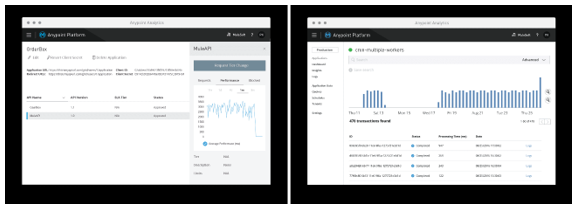Updated March 20, 2023

Overview of MuleSoft
MuleSoft is a software company that provides integration software for connecting applications, data, and devices. Basically, the company aims to integrate all your applications so that the data flow is seamless throughout all of them irrespective of the device used to access the application. The company is headquartered in San Francisco, California.
MuleSoft Anypoint Platform
It is famous for its main product – Anypoint Platform. MuleSoft Anypoint platform is an Integration Platform as a Service (iPaas). iPaas is basically an automated tool that connects applications deployed in different environments. It is used in large organizations to integrate their on-premise applications/data with cloud applications/data.
Problem
- Behind every invention, there lies a necessity. The same goes for the invention of iPaas solutions. In large organizations, no application runs in isolation. All the applications rely on data and services from other applications. This is often referred to as a cluster of applications. Add to it the expanse of devices that can be used to access the data and services. This only increases the need for integration.
- A closely-knit web of applications exchanges data and services within itself to give the desired output. For example, in a financial organization, the client’s information flows through numerous applications to serve his various needs. There may be an application to maintain his portfolio and another to diversify his investments. They all rely on data from each other.
- So, the primary need is to connect all these systems together such that the information flow is consistent, genuine, and seamless. There is no scope of information mismatch.
The solution of the MuleSoft Anypoint Platform
It tends to give a product solution to this problem with its Anypoint Platform. It achieves data, device, and application integration through APIs. The data is exposed through APIs and consumed by external systems and applications. Thus, the flow of data is managed and controlled across the network.
Advantage
The biggest advantage of MuleSoft Anypoint Platform is that now your data and services are consistently accessible across your applications and devices. It helps any organization reach the goal of becoming a cross-application organization – one in which data flows throughout without any hindrances.
Components of MuleSoft
Now that you have a fairly basic idea of how MuleSoft Anypoint Platform operates, let’s dive in deeper. The next thing to understand is the components of the Anypoint Platform that create the whole system.
1. API Designer
- The API Designer is a web-based graphical tool to develop, document, and test APIs. This facilitates the developer to create new APIs by leveraging the existing ones. For example, a developer can reuse the existing security schema in his API. This way the security schema remains consistent throughout the organization.
- The main function of the API designer is thus to build a set of code and expose it for other systems to consume and reuse. A developer can mock the API to test it with various data to ensure it functions right before deployment.

2. API Manager
- API Manager is an interface that facilitates the management of API through a console. The developer has control over the access of the API and the security protocol. Through API Manager, it is possible to control user-access to API, ensure secure connections via API Gateway, and create policies that allow or restrict API calls.
- To summarise, API Manager controls the authentication and authorization for the API.
3. Anypoint Studio
- Now that the API is built and secured, it is time to deploy the API. The deployment is handled through Anypoint Studio. It is a graphical environment through which a developer can deploy his API in a few mouse clicks. Deployment is facilitated on both on-premise and cloud environments. Anypoint Studio also packs features to map, build, edit and debug data integrations.

4. Any point Exchange
- Any point Exchange is a central hub of APIs. All the information about an API, along with the API itself is stored in Exchange. A development team can easily access APIs, templates, connectors, documentation and various other resources. Once built, they can also store their own API.
- In short, Anypoint Exchange is the Wikipedia of APIs.
5. Anypoint Connectors
- Anypoint Connectors are a set of built-in connectors that a developer can leverage to integrate applications with third-party REST and SOAP APIs. They simply plug and play endpoints available for usage.

6. Any point Analytics
Now that your API is fully functional, you would want to track its performance and usage. You can do so through Anypoint Analytics. It has an interactive dashboard that lets you visualize your API’s metrics. You can also create your own charts and graphs to focus on the metrics of your interest. The analytics also capture performance issues which are crucial for debugging.

7. Any point Monitoring
The monitoring tool helps the developers monitor their application health in real-time. This is configured by the developers themselves. They periodically supply mock data to their application and if the results returned match the anticipated ones, the application is in good health.
8. Any point Runtime Manager
The Runtime Manager is a central console that provides power to manage all resources deployed on the Anypoint Platform. An admin can provision resources as per the needs.
9. CloudHub
What if all the above components were available to you on a cloud and you need not install anything on your machine to build, design, deploy and monitor your API? Well, CloudHub does that. It is a managed service offering by MuleSoft which frees the developer from the need of installing software and hardware to operate their API and application.
Career in MuleSoft
In May 2018, it was acquired by the world-renown leader in Cloud-based solutions – Salesforce. Now, being a part of Salesforce, it has the gates opened for expansion and exponential growth. Many prestigious clients are associated with MuleSoft and the company needs bright minds to cater to more clients. Explore the MuleSoft career section and take a step closer to be a part of the Salesforce family.
Conclusion
It has the vision to provide easy solutions to tough problems through cutting-edge technology. This is the current trend in the IT industry. Businesses are looking for a plug-and-play solution to the most common problems faced by organizations across the globe. With its Anypoint Platform, it is on its way to strike gold.
Recommended Articles
This has been a guide to What is MuleSoft?. Here we discussed any point platform, problem and solution, advantage, along with components and career in MuleSoft Anypoint Platform respectively. You can also go through our other suggested articles to learn more –



